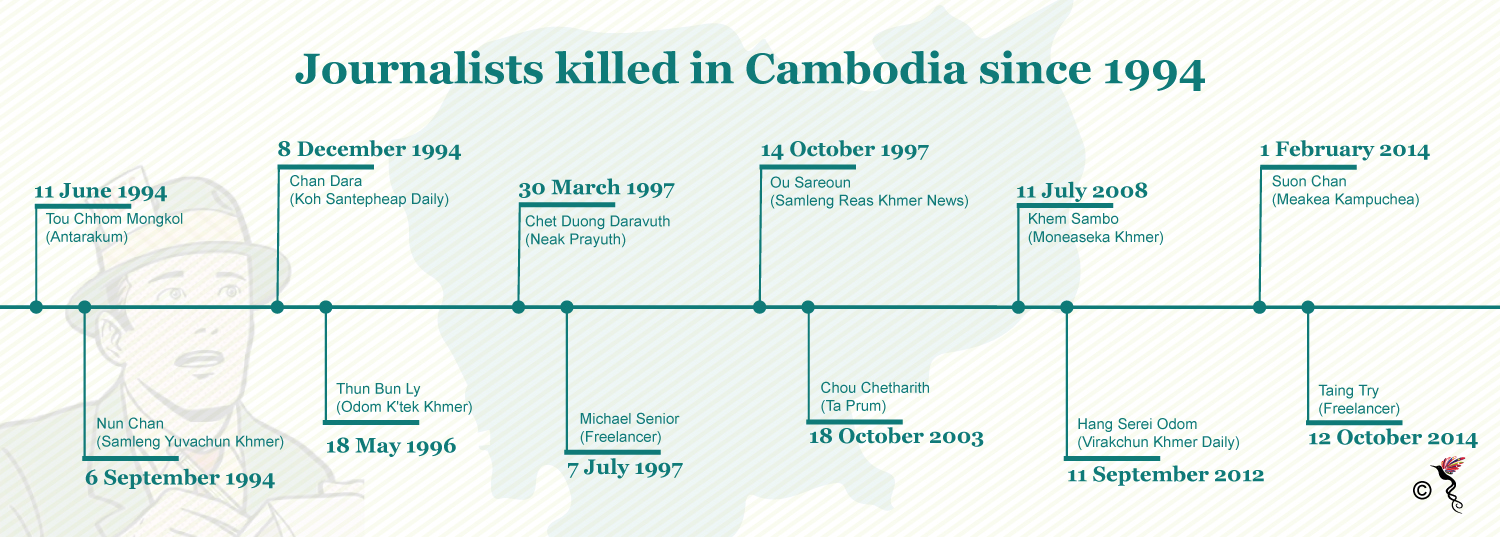Throughout the whole year, a number of independent media outlets in Cambodia have been shut down for various reasons given by the government. These unsound explanations have garnered criticism from other media outlets, non-governmental organisations, human rights councils and governments.
In a much-publicised case, The Cambodia Daily – an independent bilingual newspaper which operated for more than 24 years – was forced to shut down in early September this year after it was slapped with a 6.3 million dollars tax bill, with Cambodian Prime Minister Hun Sen telling the newspaper to pay up or leave. The newspaper’s final headline spelled out “Descent Into Outright Dictatorship”.
Prior to this, 15 other independent media outlets have also closed down in August due to the inability to follow licensing regulations and various registration requirements set by the Cambodian government – allegedly violating their contract with the Ministry of Information Cambodia.
Radio Free Asia (RFA), Voice of Democracy (VOD) and Voice of America (VOA) – all sponsored by the US government – have been particularly affected by restricted access to broadcasting time. They were being implicated for not being registered with the tax department and for failing to report the sales of their airtime. The government also accused them of provoking a regime change.
Adding fuel to the fire, the Cambodian government has become more hostile towards independent media outlets, especially after the murder of a famous political commentator and activist Kem Ley in 2016. In the last decade, many journalists in Cambodia have been murdered for covering sensitive issues related to the local government's administration.

Timeline of journalists killed in Cambodia from 1994 to 2014, as compiled by the Committee to Protect Journalists.
330 media outlets shut down
In a more recent occurrence, it was reported that Cambodia on Monday shut down 330 supposedly "inactive" print media outlets, citing the need to prevent media passes issued to them from being misused.
In a post on his Facebook page on Monday, Information Minister Khieu Kanharith said, "Today, we shut down 330 inactive media establishments; however, there remain 388 functioning newspapers, 207 magazines and 25 newsletters."
Of those shut down, 179 were newspapers, 129 magazines and 22 newsletters.
In an e-mail interview with Southeast Asian Press Alliance’s (SEAPA) Executive Director, Edgardo Legaspi, he states that “the Cambodian government seems to be continuing its clean-up of its media environment to enforce previously dormant media rules” with its move on Monday.
“As previously, the moves of the Ministry of Information are framed as administrative, like the closures of the radio stations in August. But by comparison, this appears to be less political as it targets "inactive" newspapers, rather than those who sold airtime to content providers like RFA, VOA, and VOD that are critical of the government,” he stated.
Edgardo added that “if it is really about revoking the licenses of inactive newspapers, then it may be good since the media environment in the country is quite politicized with many outlets and journalists linked to politicians or with party affiliations.”
The concern over democracy in Cambodia
These moves are occurring amid political consolidation by the ruling party ahead of the general election scheduled to be held in July next year.
Freedom of expression becomes truly questionable as the age of chaos descends upon Cambodia. The crackdowns on media outlets indicates that means of expression are heavily controlled by Hun Sen, who has been in power for the last 32 years.
“The worst aspect of this crackdown is not related to the media but with political parties, when the ruling party drew up a new law that led to the dissolution of the main opposition party,” stated Edgardo.
“With this dissolution, the government has destroyed two national elections, the previous 2013 elections that effectively discarded the votes of those who supported the opposition; and also, the coming 2018 elections, without any serious contender to the ruling party.”
“There is definitely much concern with the use of administrative rules to legitimize a crackdown on dissent,” he added.
Recommended stories: